| Srl | Item |
| 1 |
ID:
179971
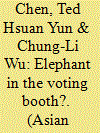

|
|
|
|
|
| Summary/Abstract |
In 2005, the single nontransferable vote system for legislative elections in Taiwan was replaced by a mixed-member majoritarian system, with an accompanying reduction in available district seats. In theory, by increasing the threshold of exclusion and placing the power of nomination in the hands of political parties, this reform should reduce vote-buying and local factionalism. We collected data on legislative nominees charged with vote-buying and on the local factional ties of candidates. Our results suggest that the reforms did reduce these problems. First, comparing the proportion of candidates charged with vote-buying before and after the reform shows a decrease in the second and third post-reform elections. Second, factional status predicts a candidate’s likelihood of running in consecutive elections before the reform but not after. Differences between factional and nonfactional candidates ceased to be significant after the reform, revealing the decreasing relevance of factions.
|
|
|
|
|
|
|
|
|
|
|
|
|
|
|
|
| 2 |
ID:
179970
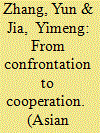

|
|
|
|
|
| Summary/Abstract |
Why and how did the International Labor Organization and the military junta of Myanmar transform their relationship so dramatically, from confrontation to cooperation, between 2007 and 2010? What insights can be drawn from this case regarding the successful operation of an international organization in an authoritarian environment? By investigating the evolution of the military leadership’s perception, this article aims to demystify authoritarian decision-making and identify the interactive mechanisms operating between internal and external dynamics and between an authoritarian regime and an international organization. The qualitative fieldwork includes direct interviews with former top military government leaders, who provide valuable insights into the decision-making logic at the highest level.
|
|
|
|
|
|
|
|
|
|
|
|
|
|
|
|
| 3 |
ID:
179968
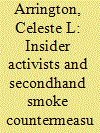

|
|
|
|
|
| Summary/Abstract |
Long considered a smoker’s paradise, Japan passed its strictest regulations yet on indoor smoking in 2018 with revisions to the Health Promotion Law and a new ordinance in Tokyo. Timed for the Tokyo Olympics, both reforms made smoking regulations stronger and more legalistic despite reflecting distinctive policy paradigms in their particulars. The national regulations curtailed smoking in many public spaces but accommodated smoking in small restaurants and bars. Tokyo’s stronger restrictions emphasized public health protection by exempting only eateries with no employees. I argue that fully understanding these contemporaneous reforms requires analyzing insider activists: state actors who participated in the tobacco control movement or had sustained interaction with it during earlier reform waves. Case studies drawing on interviews and movement and government documents illustrate the mechanisms insider activists can access because they straddle multiple fields. This article contributes to scholarship about ideas, policy entrepreneurship, and the blurry line between insiders and outsiders in policymaking.
|
|
|
|
|
|
|
|
|
|
|
|
|
|
|
|
| 4 |
ID:
179973


|
|
|
|
|
| Summary/Abstract |
Why did Japanese Prime Minister Abe impose controversial export restrictions after rulings by the South Korean Supreme Court on wartime forced laborers? This article answers this question through the lens of domestic symbolism in economic sanctions studies. We argue that domestic political calculations led the Japanese government to adopt hawkish measures against South Korea. Abe wanted to ensure continued support from his constituents and to win the upcoming election. A series of political reforms since the early 1990s have empowered the prime minister and made LDP politicians pay more attention to public opinion than to factional topography. Strong anti-Korean sentiment among the Japanese public reduced the leadership’s concerns about the audience costs of economic countermeasures. Through an examination of the interplay among various domestic actors over the policy measure, this study provides insights on how domestic symbolism can serve as an origin of foreign policy decision-making in democracies.
|
|
|
|
|
|
|
|
|
|
|
|
|
|
|
|
| 5 |
ID:
179972
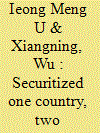

|
|
|
|
|
| Summary/Abstract |
This paper examines how Macau, with a different political and legal system under the “one country, two systems” principle, fits into China’s securitization and what impact that has on its local governance. We argue that in recent years Macau’s legal system has gradually transformed into a means of social control. Through case files related to the Assembly and Demonstration Law drawn from the Court of Final Appeal, we demonstrate that although Macau is unlike Hong Kong, where dissidents are subject to severe repression, Beijing’s emphasis on national security has weakened the checks-and-balances function of Macau’s legal system and substantially narrowed the scope of freedom of speech, even though it is nominally guaranteed and protected by the Basic Law.
|
|
|
|
|
|
|
|
|
|
|
|
|
|
|
|
| 6 |
ID:
179969
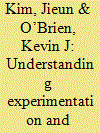

|
|
|
|
|
| Summary/Abstract |
Studies of local governance in China often point to nimble experimentation but problematic implementation. To reconcile these competing images, it is useful to clarify the concepts of experimentation and implementation and see how they unfolded in one policy area. The history of China’s Open Government Information (OGI) initiative shows that the experimentation stage sometimes proceeds well and produces new policy options, but may falter if local leaders are unwilling to carry out an experiment. And the implementation stage often poses challenges, but may improve if the Center initiates new, small-scale experiments and encourages local innovation. This suggests that the experimentation and implementation stages are not so different when officials in Beijing and the localities have diverging interests and the Center is more supportive of a measure than local officials. The ups and downs of OGI, and also village elections, can be traced to the policy goal of monitoring local cadres, the central–local divide, and the pattern of support and opposition within the state.
|
|
|
|
|
|
|
|
|
|
|
|
|
|
|
|